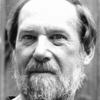Ten men on a postcard clinging to the cables
of Brooklyn Bridge they look one can't help it
like insects glued to the struts of some unspeakable web
some things will die with us memories words
almost everything will die with us unspoken
it's nearly gone the sound of waves
pummeling the beach a seagull's sharp demands
a hundred years if we had them
won't matter much less the years we've had
those men suspended in air dry leaves
caught in a fence before the wind hauls them away
what do they say in their best suits
perched nonchalantly above the flames of the East River
what matters is that we have been here at all
waves heave up and burst in bright concussions of foam
seagulls weave above it slandering
in the distance flags of smoke that never touch land
why not speak of what we know
instead of dangling always above the ineffable
on the opposite side no address no message
what matters is that we have been here at all
so they say but what does the wind say
after the men are gone blowing through those empty cables
-
Spring Feature 2014
-
Feature
- Kurt Brown A Photo Tribute
- Kurt Brown Excerpts from his "Notebook"
-
Poetry
- Laure-Anne Bosselaar
- Lee Briccetti
- Wyn Cooper
- Stephen Dunn
- Richard Garcia
- Janlori Goldman
- Andrey Gritsman
- Kamiko Hahn
- Steve Huff
- Meg Kearney
- Eugenia Leigh
- Thomas Lux
- Laura McCullough
- Christopher Merrill
- Kamilah Aisha Moon
- Martha Rhodes
- David Rothman
- Harold Schechter
- Charles Simic
- Tree Swenson
- Charles Harper Webb
- Marty Williams
-
Essay
- David RigsbeeOn Kurt Brown, An Appreciation
Feature > Poetry
I often felt that Kurt lacked the selfishness of a typical, successful writer. He continued to be more interested in others than in himself, as is evident by his editorship of various anthologies. But he and Laure-Anne each had a keen, though different sense of self-protectiveness. Kurt held back the personal in both his daily encounters and in his work, whereas Laure-Anne's apparent outgoingness gave her permission to let us feel intimate with her while she was in the act of telling only what she wanted us to know. When Kurt's poems started to open up, it seemed he had learned from many sources, not just from Laure-Anne's example, ways to risk disclosure without being nakedly confessional. It seemed that his early tendency toward prolixity had been replaced by an ear that knew what and when was enough, and what language—not just information—cooperated with other language. Ultimately. we got necessary details infused with tone. He had discovered his own quiet music; he had learned to accompany himself.
"Snapshot," from his 2010 book No Other Paradise, with its staggered couplets and italicized refrain line that serve to pace and frame the poem's effects, represents a new way of moving in a poem for Brown.
A new way of moving, yes, and an eerie kind of prescience as well. It's as if the poet was acutely conscious of his mortality, or he was allowing his normally submerged unconscious to finally do the talking: "what matters is that we have been here at all." The poem is as exquisite as it is economical in its phrasing and is mysterious in ways that make some earlier Brown poems seem merely denotative. He leaves us with a question that omits its question mark, a suggestion that the wind says nothing—if it says anything at all—that is answerable. But the poem foreshadows his death, a man in his sixties who, of course, would be thinking about such a thing even without immediate cause.
"Snapshot," from his 2010 book No Other Paradise, with its staggered couplets and italicized refrain line that serve to pace and frame the poem's effects, represents a new way of moving in a poem for Brown.
A new way of moving, yes, and an eerie kind of prescience as well. It's as if the poet was acutely conscious of his mortality, or he was allowing his normally submerged unconscious to finally do the talking: "what matters is that we have been here at all." The poem is as exquisite as it is economical in its phrasing and is mysterious in ways that make some earlier Brown poems seem merely denotative. He leaves us with a question that omits its question mark, a suggestion that the wind says nothing—if it says anything at all—that is answerable. But the poem foreshadows his death, a man in his sixties who, of course, would be thinking about such a thing even without immediate cause.


